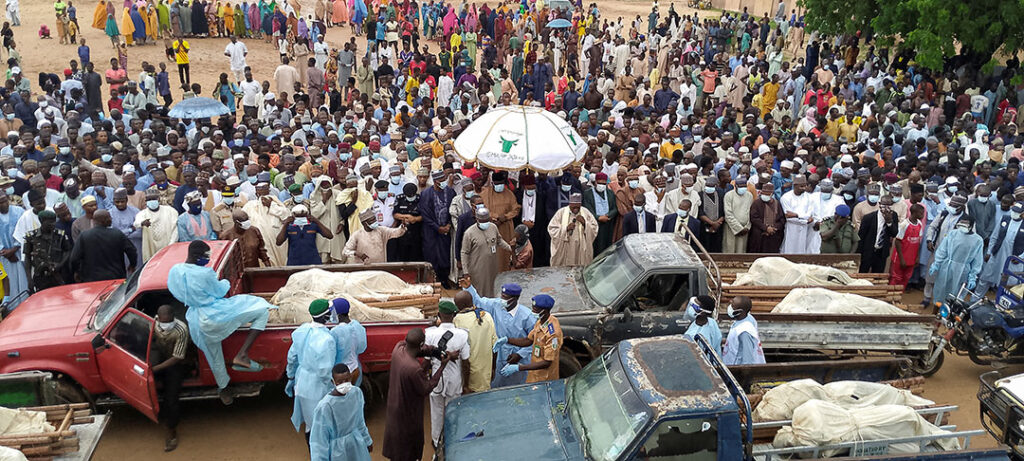Boko Haram and the Islamic State West Africa Province (ISWAP) have begun using armed drones and roadside bombs as violence surges in northeast Nigeria.
At least 22 people were killed and several others wounded in two attacks in Borno and Adamawa states over three days in late April. In Borno’s Gwoza area, militants killed 10 civilians a day after killing two members of the Civilian Joint Task Force.
“They went to a nearby bush in search of firewood on Saturday when the boys [insurgents] ambushed them and killed ten and left two with life-threatening injuries,” said Mohammed Shehu Timta, the region’s emir, referring to the 10 civilians, in a report by Nigeria’s Punch newspaper.
It was not clear which group or groups committed the attack.
In Adamawa’s Hong district, gunmen believed to be with Boko Haram killed 10 people and injured several others in the village of Kopre, Reuters reported. Afterward, regional police spokesperson Suleiman Yahaya Nguroje said in a news release that more police officers and Soldiers were deployed to bolster security in Kopre.
Borno State Gov. Babagana Zulum warned in early April that Boko Haram had dislodged some military formations in several districts and killed civilians and security forces.
“It is a setback in the fragile state of Borno and the North East region,” Zulum told security forces, according to Reuters. “The renewed Boko Haram attacks and kidnappings in many communities, almost on a daily basis without confrontation, signaled that Borno State is losing ground.”
Analysts say the increased attacks unfolded amid a lull in fighting between Boko Haram and ISWAP. The groups occasionally execute joint operations. On March 25, Boko Haram and ISWAP killed 12 Cameroonian Soldiers and wounded 10 more in an attack at a military base in the Borno State border town of Wulgo.
The Cameroonian Ministry of Defense said the terror groups used “advanced weaponry they increasingly have at their disposal.” The weapons included drones loaded with explosives.
“The attack in Wulgo is a sign of a resurgence in power of these fighters,” journalist Franck Foute wrote for Jeune Afrique.
Analysts say the use of armed drones suggests that ISWAP is receiving more funding from the Islamic State group (IS).
Vincent Foucher, a research fellow at the French National Centre for Scientific Research, who has interviewed former fighters, said there were reports that IS advisors were sent in to help ISWAP fighters on the ground.
“They can improve the tactics, and we have seen the use of drones and explosives and large-scale attacks,” Foucher told Reuters. “This could be taken as impact of the advice from the Islamic State.”
Also on March 25, Boko Haram and ISWAP fighters struck an Army base in Borno State’s Wajiroko area. A Soldier in Wajiroko told Reuters that at least four Soldiers were killed and several others injured, including the brigade commander. The attackers also burned military patrol vehicles.
“Both groups have become a bit bolder and showed they have some sophisticated technology,” James Barnett, a Hudson Institute research fellow who conducts fieldwork on insecurity in Nigeria, told Reuters.
Malik Samuel, a senior researcher at security think tank Good Governance Africa, said the groups also are resilient and adaptive to military tactics.
“Their current resurgence mirrors previous periods when they took the fight to the military, instead of waiting for the military to attack before repelling them,” Samuel told Reuters.
The terror groups also are adopting new funding methods. ISWAP has updated its financial playbook, transforming parts of northeastern Nigeria into a conflict-driven economy through a complex blend of taxation, extortion, smuggling and ideological justification, HumAngle reported.
Both groups also have turned to the dark web to generate revenue by exploiting the anonymity of cryptocurrencies to evade traditional financial surveillance. They use platforms such as Monero, a digital crypto page with enhanced privacy features, to solicit donations.

